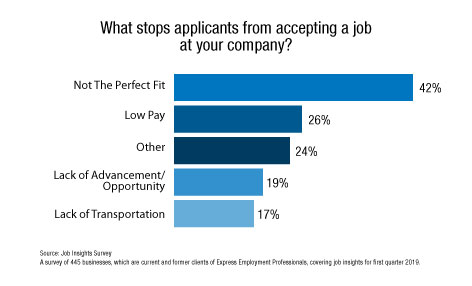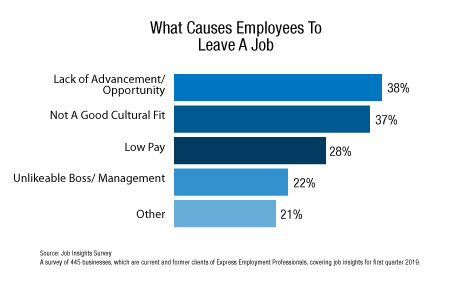Job Seekers Ghosting Interviews has Employers Scared
TORONTO - February 27, 2019

Low Wages, Multiple Offers Among Top Reasons
Fierce Competition for Workers
With unemployment near record lows and the number of job vacancies increasing, "ghosting" by job seekers is on the rise, according to Express Employment Professionals owners.
Employers are becoming worried and frustrated by the increasing occurrence of prospective employees who simply do not show up with no notice - or "ghost" - job interviews. There has also been a noticeable increase in the number of jobs seekers who stop showing up to work shortly after starting a new job.
Because jobs are more plentiful, employers have to compete over wages and employees may get multiple interview requests or job offers. As a result, job seekers can "ghost" interviews and jobs that pay less or are less appealing.
"We have seen a steady rise in job seekers ghosting interviews," said Shane DeCoste, an Express franchise owner in Halifax, Nova Scotia. "We are seeing people changing jobs at an unprecedented rate because of the level of opportunity that is in the market. Gone are the days where employees cling to job security like maybe their parents or grandparents did. They are on the lookout for opportunities to improve their position."
Ted Maksimowski, an Express franchise owner of three operations in Ontario (Hamilton, Burlington and Brantford) is seeing the same trend. "Ghosting interviews is an increasing occurrence. We have also seen an increase in the number of cases where a candidate accepts a job offer and leaves shortly after starting for what they perceive is a better opportunity."
According to a new survey of businesses from Express, low pay is one of the top reasons that job seekers will turn down job offers and why employees will leave a job.
In the survey, 26 per cent of businesses said that "low pay" is among the things that "stop applicants from accepting a job at your company." That was second only to "not the perfect fit."
Similarly, 28 per cent cited "low pay" when asked about "what causes an employee to leave a job." That was third behind "lack of advancement" and "not a good cultural fit."


"Wages that were market average or above can quickly become below market average in certain segments based on regional changes such as a minimum wage increase," said DeCoste. "We have seen instances of bidding wars for more skilled roles that require unique skill sets."
"Employers that have felt the pain of being short staffed for several months understand the value that qualified talent can add to their business, so they are willing to spend more," he adds. "Wages that are not competitive can increase turnover and escalate labour costs."
"Employers have had to increase the starting wage to keep the difference between the minimum wage and the starting wage as high as possible," said Maksimowski. "Ideally the placement has to offer at least the possibility of full time employment and an increase in salary when a permanent offer is extended."
But as the Express survey of business found, in a tight labour market, employers have to do more than just increase wages. Both DeCoste and Hein recommend employers move quickly.
"Employers are having to sell job opportunities to prospective candidates more than they have had do in a very long time," said Maksimowski. "As the competition for candidates is fierce, employers have to be very specific in describing the 'What's In It For Me' for the candidate. Working conditions, training, flexible hours, and advancement opportunities are other factors prospective candidates are looking for."
Workplace culture is quickly becoming a much larger consideration, notes DeCoste. "Job seekers that see similar wages for their skill set will be comparing culture and reputation of companies they are considering opportunities with."
Interestingly, DeCoste has noticed a generational divide when it comes to ghosting. "We do see that younger generations seem to ghost an interview while older generations will often let us know that they are no longer interested and sometimes," he said. "Given the various modes of communication available, job seekers should take a moment to provide an update if they decide not to go to an interview or to leave an employer after accepting an offer. Employers keep records on interactions with candidates and you never want to burn a bridge with any company."
"Competitive pay is the surest way to ensure you're hiring a dedicated employee and not a 'ghost,'" said Bill Stoller, CEO of Express. "Some employers still haven't recognized how fierce the competition is.
Good talent requires good pay. While that may seem expensive to some employers, investing time in recruiting, interview and hiring 'no-shows' can get pretty expensive too."
The survey of 445 businesses, which are current and former clients of Express Employment Professionals, was conducted in December 2018 to gauge respondents' expectations for 2019.
###
If you would like to arrange for an interview to discuss this topic, please contact Ana Curic at (613) 858-2622 or email
ana@mapleleafstrategies.com.
About Bill Stoller
William H. "Bill" Stoller is chairman and chief executive officer of Express Employment Professionals. Headquartered in Oklahoma City, the international staffing company has more than 800 franchises in the U.S., Canada and South Africa. Since its inception, Express has put more than 7.7 million people to work worldwide.
About Express Employment Professionals
Express Employment Professionals puts people to work. It generated $3.56 billion in sales and employed a record 566,000 people in 2018. Its long-term goal is to put a million people to work annually. For more information, visit
ExpressPros.com.